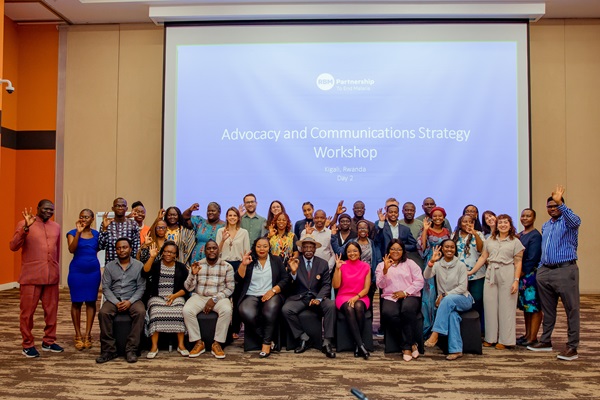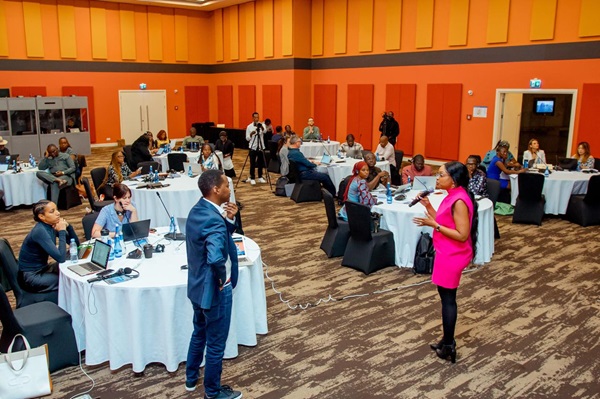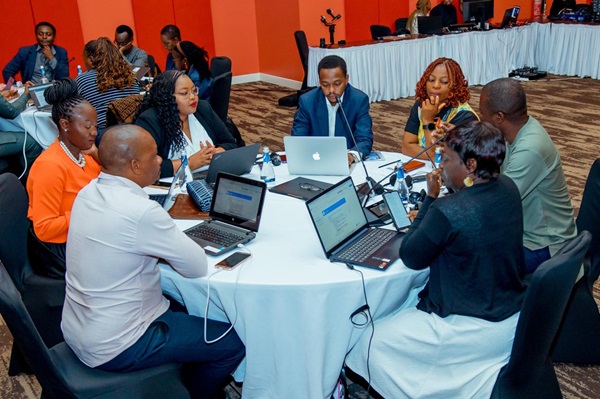
The RBM Partnership to End Malaria has convened with its partners to review and harmonise communication strategies for the Big Push – a renewed global effort to eliminate malaria in Africa.
The RBM Advocacy and Communications Workshop, held at the Convention Centre in Kigali, Rwanda, brought together policymakers, donor agencies, civil society organisations, health practitioners, advocacy groups, communicators, and public servants. Participants engaged in strategic discussions to strengthen global coordination and enhance malaria advocacy efforts.
In his presentation, CEO of the RBM Partnership to End Malaria, Dr. Michael Charles explained that the Big Push was launched in response to country-driven demands for innovative and intensified malaria eradication efforts, following stalled global progress in the fight against the disease.
After 15 years of significant progress, global efforts to combat malaria have slowed, and achieving the Sustainable Development Goal (SDG) targets on malaria elimination appears increasingly difficult. This challenge presents a critical opportunity for stakeholders to prepare the ecosystem for eradication, while also ensuring the adoption of new, transformative tools for malaria control.
Dr. Charles emphasized that the Big Push is a coordinated set of priority actions aimed at overcoming existing barriers and accelerating the path to malaria eradication. The initiative, which outlines strategic steps for the next five years, directly addresses 80 to 90 per cent of the priorities outlined in the Yaoundé Declaration and the Lusaka Agenda.
“The Big Push seeks to actualise and operationalise existing malaria elimination strategies, backed by a robust accountability mechanism,” Dr. Charles explained. “It includes 80 per cent of previously identified actions that require acceleration or were previously unsuccessful, along with 20 per cent of new actions designed to drive further progress.”
He stressed the need for stakeholders to rethink their approaches, optimise the use of limited resources, and effectively communicate malaria elimination efforts to mobilise additional funding and support.
Speaking at the event, Lizz Ntonjira, Global Communications and External Engagement Advisor at the RBM Partnership to End Malaria, highlighted the crucial role of communication and advocacy in achieving malaria elimination goals.

Ntonjira noted that the RBM Partnership to End Malaria, hosted by the United Nations Office for Project Services (UNOPS), is the largest global platform for coordinated malaria action. Comprising over 500 partners – including community health workers, researchers, malaria-endemic and donor countries, businesses, and international organisations – the partnership works to unify global malaria control efforts.
She explained that the RBM Advocacy and Communications Workshop aimed to enhance collaborative efforts, ensuring that malaria remains a global health priority.
Ntonjira also recalled that RBM partners convened in Switzerland in October 2024 to develop the 2025 Advocacy and Communications Strategy. Building on this momentum, the Kigali workshop focused on:
- Reviewing RBM’s five-year malaria elimination strategy.
- Aligning advocacy and communication strategies at the country, regional, and global levels.
- Mapping key stakeholders, partners, and audiences in malaria-endemic countries.
- Preparing for major global advocacy moments, such as World Malaria Day and the 8th Global Fund Replenishment campaign.
During the workshop, division manager for Malaria and Other Parasitic Diseases (MOPD) Control in Rwanda, Dr. Amiable Mbituyumuremyi shared insights on the country’s achievements in malaria control.
He noted that Rwanda has extended its Malaria National Strategic Plan (NSP) from 2020 to 2027, to reduce malaria morbidity and mortality by at least 90 per cent from 2019 levels.
Mbituyumuremyi outlined Rwanda’s key malaria control objectives for 2027, including:
- Ensuring that at least 90 per cent of the population at risk receives effective protection through preventive interventions.
- Guarantee that all suspected malaria cases are promptly tested and treated under national guidelines.
- Strengthening surveillance and reporting systems to ensure timely and accurate data collection for better decision-making.
- Enhancing coordination and collaboration across all levels of malaria control efforts.
- Promoting correct and consistent malaria prevention behaviours among at least 85 per cent of the at-risk population.
In an exclusive interview, the executive director of the Block Malaria Africa Initiative in Nigeria, Odinaka Obeta underscored the importance of a harmonised global approach to malaria communication.

“Malaria elimination is not just a medical or scientific challenge – it requires a coordinated and sustained communication effort to drive behaviour change, policy action and community engagement,” Obeta stated.
He warned that without a unified communication strategy, misinformation spreads easily, interventions become fragmented and resources are wasted.
“As Nigeria intensifies its malaria elimination efforts – through initiatives such as the Nigeria Malaria and Neglected Tropical Diseases (NTDs) Youth Corps, increased domestic production of bed nets, and expanded vaccine rollouts – effective communication will be key to ensuring these interventions achieve maximum impact,” he added.
Obeta further emphasised the need for strong global advocacy to support initiatives such as the 8th Global Fund Replenishment, which will be crucial in securing financial commitments from donor countries for malaria control programs.
“This is why media, civil society and communication stakeholders must align their messaging – ensuring that malaria remains a top global health priority and mobilising governments to sustain action,” he stressed.
According to him, clear, strategic and unified communication will:
- Increase awareness about malaria elimination strategies.
- Encourage greater uptake of malaria prevention and treatment interventions.
- Drive stronger political commitments to malaria eradication.
The RBM Advocacy and Communications Workshop ended with a renewed commitment from partners to strengthen collaboration, enhance advocacy strategies, and ensure malaria elimination remains a priority on national and global agendas.
As Africa and the global community push forward with intensified malaria control efforts, a harmonised approach to communication andadvocacy will be essential in driving progress toward a malaria-free world.


